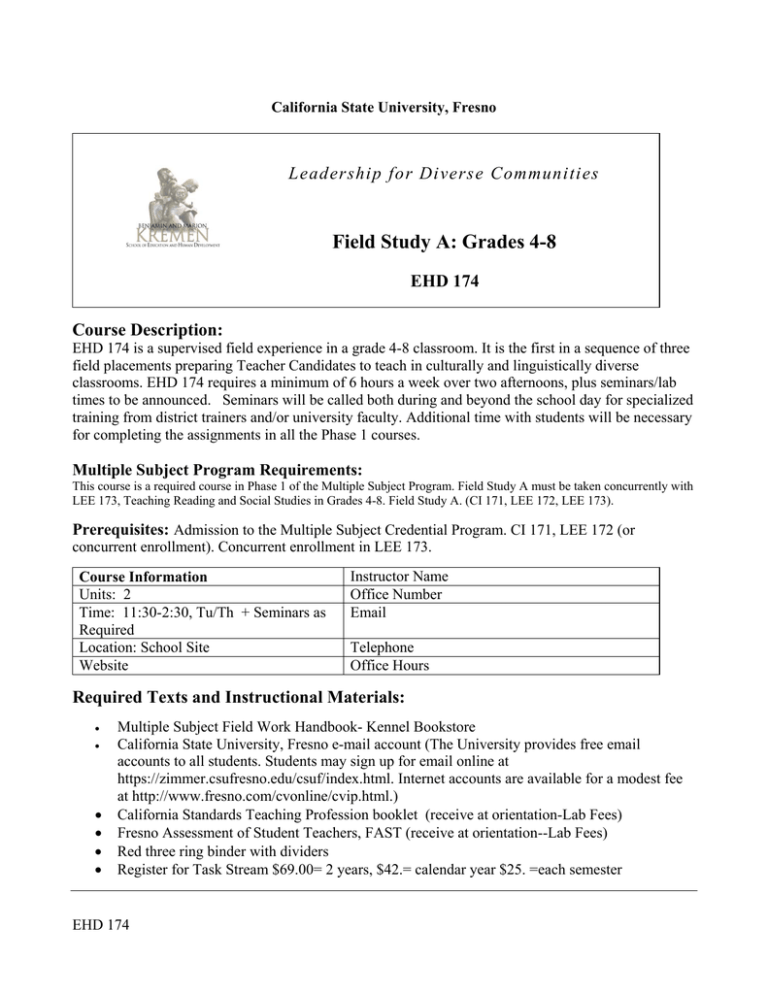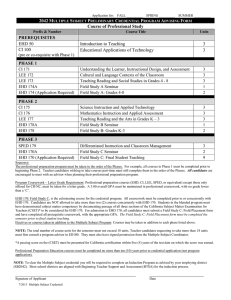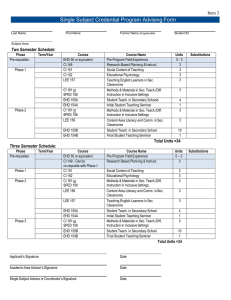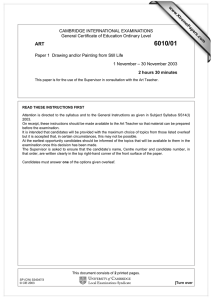Field Study A: Grades 4-8 EHD 174 Course Description:
advertisement

California State University, Fresno Leadership for Diverse Communities Field Study A: Grades 4-8 EHD 174 Course Description: EHD 174 is a supervised field experience in a grade 4-8 classroom. It is the first in a sequence of three field placements preparing Teacher Candidates to teach in culturally and linguistically diverse classrooms. EHD 174 requires a minimum of 6 hours a week over two afternoons, plus seminars/lab times to be announced. Seminars will be called both during and beyond the school day for specialized training from district trainers and/or university faculty. Additional time with students will be necessary for completing the assignments in all the Phase 1 courses. Multiple Subject Program Requirements: This course is a required course in Phase 1 of the Multiple Subject Program. Field Study A must be taken concurrently with LEE 173, Teaching Reading and Social Studies in Grades 4-8. Field Study A. (CI 171, LEE 172, LEE 173). Prerequisites: Admission to the Multiple Subject Credential Program. CI 171, LEE 172 (or concurrent enrollment). Concurrent enrollment in LEE 173. Course Information Units: 2 Time: 11:30-2:30, Tu/Th + Seminars as Required Location: School Site Website Instructor Name Office Number Email Telephone Office Hours Required Texts and Instructional Materials: • • • • • • Multiple Subject Field Work Handbook- Kennel Bookstore California State University, Fresno e-mail account (The University provides free email accounts to all students. Students may sign up for email online at https://zimmer.csufresno.edu/csuf/index.html. Internet accounts are available for a modest fee at http://www.fresno.com/cvonline/cvip.html.) California Standards Teaching Profession booklet (receive at orientation-Lab Fees) Fresno Assessment of Student Teachers, FAST (receive at orientation--Lab Fees) Red three ring binder with dividers Register for Task Stream $69.00= 2 years, $42.= calendar year $25. =each semester EHD 174 Primary Learning Outcomes: The learning outcomes are aligned with the Standards of Quality and Effectiveness for Professional Teacher Preparation Programs adopted by the California Commission on Teacher Credentialing (CCTC), Teaching Performance Expectations (TPE), the National Council for Accreditation of Teacher Education (NCATE) Standards, and the KSOEHD Dispositions: Reflection, Critical Thinking, Professional Ethics, Valuing Diversity, Collaboration, LifeLong Learning. Teacher Candidates will demonstrate the ability to strategically plan, schedule and deliver reading instruction incorporating the following: (CCTC 4, 7A, 12; TPE 1; RICA 2, 3, 5, 6, 8, 12, 14; NCATE 1.1) • Word analysis • Fluency systematic • Vocabulary development • Reading comprehension • Literacy response and analysis • Writing strategies and applications Written and Oral English Language conventions • Listening and speaking strategies and applications Teacher Candidates will demonstrate the ability to make reading and History/Social Science content accessible to all students through: (CCTC 3, 4, 9, 8Ac, 12; TPE 4; RICA 6, 10, 12, 14; NCATE 1.3, 1.4) • Creating and adjusting lesson designs relative to students’ current level of achievement • Using instructional materials appropriately • Varying instructional strategies to enhance reading and comprehension over a variety of content texts and informational sources • Prioritizing and sequencing essential skills • Modeling active listening Teacher Candidates will demonstrate their ability to teach state-adopted content standards for students in History/Social Science by using analytical thinking to help teach temporal and spatial scale, historical periods, cultures, events and periods. To facilitate understanding of History/Social Science, candidates will learn to utilize: simulations, case studies, cultural artifacts, works of art and literature, cooperative projects and student research activities in their lessons. (CCTC 8Ac; TPE 1, 9; NCATE 1.1, 1.3) Teacher Candidates will demonstrate an understanding of the application of different teaching models in the classroom through observation and reflection. (CCTC 4; TPE 9; NCATE 1.3) Teacher Candidates will demonstrate their understanding making content accessible to English Learners by incorporating SDAIE strategies into their Reading/Language Arts and Social Studies lesson plans. (CCTC 7A, 9, 12, TPE 7; NCATE 1.4) EHD 174 Examinations and Major Assignments Schedule: Date Week 8 Week 11-13 Last Week of Instruction EHD 174 Assignment Documentation for 50% of EHD 174 and Literacy Development competencies. Comprehensive Lesson Plan Project Exam All EHD 174 competencies as outlined in the EHD 174 Competency Log must be successfully completed and verified by the University Supervisor by the last day of instruction. Course Policies Grading: Teacher Candidates receive a grade of credit or no-credit as a result of their performance in their field assignment(s). Field Study A provides many opportunities for multi-modal assessments. University Supervisors will visit the school site at least once a week. Reflective journaling, observations, written lesson plans, lesson analysis and implementation of teaching strategies with students in the classrooms will provide evidence of proficiency. The supervisor signs a Mid-Semester Self Reflection/Goal Setting form and verifies competencies throughout the semester. Competencies are outlined in the Multiple Subject Field Placement Handbook. A score of 2 or above is necessary to pass the Comprehensive Lesson Plan Project. Satisfactory completion of all competencies, as verified by the University Supervisor, is required for credit in the course. Attendance: Case studies and other Phase I course related assignments may be drawn from students in Field Placement A, however, additional time outside of required field placement hours will be necessary to complete these assignments. Regular attendance is imperative. Teacher Candidates are expected to arrive at the school on time and to remain at the school for the full-designated period. Absences, leaving early, or tardiness are dealt with on an individual basis. Teacher Candidates will be required to make-up time absent by adding days to the field placement experience. If a Teacher Candidate is going to be absent, he or she must notify the University Supervisor, the school and School Site Partner/Master Teacher by 7:30 AM on the day of their assigned class time. It may be necessary to have someone bring materials and/or lesson plans to the classroom to be used in the Teacher Candidate’s absence. Excess absences may result in a No Credit for the course. Professional Ethical Behavior: As a guest at the assigned school site, it is expected that the Teacher Candidate model exemplary professional and ethical behavior at all times. Professional behavior includes not receiving and or making cell phone calls or texts during class time. My Space or similar online forms of communication should be kept professional. The Teacher Candidate Code of Ethics and Confidentiality of Student Records in the Field Placement Handbook (pages 16-17) can serve as a guide. The Professional Dress: The Teacher Candidate maintains a professional appearance. An appropriate appearance is defined as clothing that models professionalism for students. Do not wear low rise pants, tops that do not reach below the top of pants or plunge low, spaghetti straps, tube tops, halter tops, jeans, shorts, miniskirts or attire that is revealing or detracts from the professional role of a teacher is unacceptable. Be sure to meet school dress and safety codes. School dress codes may not allow the wearing of the Bulldog insignia. A Teacher Candidate may be asked to leave their assignment if appearance is not appropriate or a professional ethical demeanor is not maintained. EHD 174 Tentative Course Schedule: Field Study A requires Teacher Candidates to be at the assigned school site in the classroom with students a minimum of 6 hours over at least 2 afternoons, as well as, scheduled seminars. Because school schedules vary, duty hours may be adjusted by the University Supervisors and Master Teachers. Case studies and other Phase I course related assignments maybe drawn from students in Field Study B, however, additional time outside of regular field placement hours will be necessary to complete these assignments. SEMINARS/GROUP MEETINGS/INDIVIDUAL DISCUSSIONS Small Group Discussions should allow the supervisor opportunities to present suggestions and to impart the experience that they have to their teacher candidates. These can be individual or group meetings. Week 1 Tues. Thurs. Fri. General Teacher Candidate Orientation- Introduction of Supervisors Classroom Management Seminar Team Building Seminar Week 2 Tues. Small Group Discussion/Task Stream Registration: EHD 174 Competencies Lesson Planning – cut and paste activity Lesson Planning Video Observation -Tape 1 Task Stream-Dispositions Survey and Demographic survey Thurs. Social Studies Seminar Fri. Team Building Seminar Week 3 Tues. Small Group Discussion: Lesson Planning Video Observation- Tape 2 Teacher Performance Expectations Activity Comprehensive Lesson Plan Project review Thurs. Geography/ Social Studies Seminar Week 4 Tues. Principal Orientation at School Site School Site Partner Orientation at School Site Small Group Discussion: Instructions for Guided Observation Week 5 Tues. Guided Observation in the Classroom Thurs. Begin Placement EHD 174 Week 6 Small Group Discussion Sharing and review of Guided Observation Activity Week 7 or 8 Small Group Discussion Mid Semester Self Reflection Goal Setting with lesson plan attached Documentation for 50% of EHD 174 Field Study A competencies. Give directions for Comprehensive Plan Project Mid-semester Self Reflection/Goal Setting meeting facilitated by University Supervisor. Week 12 Comprehensive Lesson Plan Project Test Scheduled Weeks 9-15 Social Studies/History Project implemented in the classroom Week 13-15 Complete Supervisor Evaluation, and Master Teacher Survey on Task Stream Subject to Change: This syllabus and schedule are subject to change in the event of extenuating circumstances. EHD 174, Phase I Seminars: Classroom Management Classroom management in phase I is a 3 hour interactive seminar. The focus of this seminar is making positive connections with students and creating an effective learning environment. Small group activities include role plays, simulations and opportunities for teacher candidates to practice strategies that they can use to engage small groups of students. Participating in these Classroom Management activities helps teacher candidates learn how to develop safe, inclusive positive learning environments that promote respect, value difference, and mediate conflicts according to state laws and local protocol. CCTC 5 Geography/Social Studies Fresno State partners with the Geographic Alliance (sponsored by National Geographic) for this 3 hour seminar. The teacher candidates rotate through 3 different sessions that are taught by classroom teachers who have received training from the Geographic Alliance. The teacher candidates are engaged in hands on activities that provide ideas and resources for supporting them to teach state adopted academic content standards for students. They learn to use timelines and maps as tools to give students a sense of temporal and spatial scale. CCTC 8A(c) EHD 174 Social Studies Teacher candidates rotate through 3 different sessions that are taught by exemplary classroom teachers. These classroom teachers model and have the teacher candidates practice effective teaching by integrating concepts and themes which provide insights into historical periods and cultures. They help candidates understand events and periods from multiple perspectives by using simulations, case studies, cultural artifacts, works of art and literature, cooperative projects and students research activities. The teacher candidates also learn to use analytical thinking skills in history and social science. Immersing themselves in these activities helps candidates internalize strategies that will help them implement adopted academic content standards. Teacher candidates are required to demonstrate their understanding and apply what they learned by teaching a series of social studies lessons in their field placements. CCTC 8A(c) Team Building All the teacher candidates in a cohort meet outdoors near the San Joaquin River for 3 hours of interactive activities. They learn the importance of connecting with students and building a cohesive, cooperative classroom environment. These activities help in completing cooperative assignments in EHD 174 and also give ideas and resources that they can use in their future classrooms. Participating in these Team Building activities helps teacher candidates learn how social, emotional, cognitive, cultural, and pedagogical factors impact student learning outcomes, and how a teacher’s beliefs, expectations, and behaviors strongly affect learning on the part of student groups and individuals. CCTC 5 EHD 174 University Policies Students with Disabilities: Upon identifying themselves to the instructor and the university, students with disabilities will receive reasonable accommodation for learning and evaluation. For more information, contact Services to Students with Disabilities in Madden Library 1049 (278-2811). Honor Code: “Members of the CSU Fresno academic community adhere to principles of academic integrity and mutual respect while engaged in university work and related activities.” You should: a) understand or seek clarification about expectations for academic integrity in this course (including no cheating, plagiarism and inappropriate collaboration) b) neither give nor receive unauthorized aid on examinations or other course work that is used by the instructor as the basis of grading. c) take responsibility to monitor academic dishonesty in any form and to report it to the instructor or other appropriate official for action. Instructors may require students to sign a statement at the end of all exams and assignments that “I have done my own work and have neither given nor received unauthorized assistance on this work.” If you are going to use this statement, include it here. Cheating and Plagiarism: Cheating is the actual or attempted practice of fraudulent or deceptive acts for the purpose of improving one's grade or obtaining course credit; such acts also include assisting another student to do so. Typically, such acts occur in relation to examinations. However, it is the intent of this definition that the term 'cheating' not be limited to examination situations only, but that it include any and all actions by a student that are intended to gain an unearned academic advantage by fraudulent or deceptive means. Plagiarism is a specific form of cheating which consists of the misuse of the published and/or unpublished works of others by misrepresenting the material (i.e., their intellectual property) so used as one's own work." Penalties for cheating and plagiarism range from a 0 or F on a particular assignment, through an F for the course, to expulsion from the university. For more information on the University's policy regarding cheating and plagiarism, refer to the Class Schedule (Legal Notices on Cheating and Plagiarism) or the University Catalog (Policies and Regulations). Make Up Policy for Planned and Unplanned Absences: In the case of an unplanned student absence, papers, tests, and/or homework assignments due during the time the student is absent may be made up only if the student contacts the instructor as soon as practicable after the absence occurs and works out a plan. In the case of authorized absences due to university-sponsored activities, students should expect to submit their work to the instructor on or before the due date, or as arranged with the instructor. This includes papers, tests, and/or homework assignments. See grading policy in syllabus for additional information. When a student is absent for an extended time period, a viable make-up plan may not be feasible. In these circumstances, other options such as dropping the class for a serious and compelling reason or withdrawal from the university may be appropriate. EHD 174 Computers: "At California State University, Fresno, computers and communications links to remote resources are recognized as being integral to the education and research experience. Every student is required to have his/her own computer or have other personal access to a workstation (including a modem and a printer) with all the recommended software. The minimum and recommended standards for the workstations and software, which may vary by academic major, are updated periodically and are available from Information Technology Services (http://www.csufresno.edu/ITS/) or the University Bookstore. In the curriculum and class assignments, students are presumed to have 24-hour access to a computer workstation and the necessary communication links to the University's information resources." Disruptive Classroom Behavior: "The classroom is a special environment in which students and faculty come together to promote learning and growth. It is essential to this learning environment that respect for the rights of others seeking to learn, respect for the professionalism of the instructor, and the general goals of academic freedom are maintained. ... Differences of viewpoint or concerns should be expressed in terms which are supportive of the learning process, creating an environment in which students and faculty may learn to reason with clarity and compassion, to share of themselves without losing their identities, and to develop and understanding of the community in which they live . . . Student conduct which disrupts the learning process shall not be tolerated and may lead to disciplinary action and/or removal from class." Copyright policy: Copyright laws and fair use policies protect the rights of those who have produced the material. The copy in this course has been provided for private study, scholarship, or research. Other uses may require permission from the copyright holder. The user of this work is responsible for adhering to copyright law of the U.S. (Title 17, U.S. Code). To help you familiarize yourself with copyright and fair use policies, the University encourages you to visit its copyright web page: http://www.csufresno.edu/library/libraryinformation/campus/copyright/copyrtpolicyfull.pdf For copyright Questions & Answers: http://www.csufresno.edu/library/libraryinformation/campus/copyright/faqcopyright.pdf Digital Campus course web sites contains material protected by copyrights held by the instructor, other individuals or institutions. Such material is used for educational purposes in accord with copyright law and/or with permission given by the owners of the original material. You may download one copy of the materials on any single computer for non-commercial, personal, or educational purposes only, provided that you (1) do not modify it, (2) use it only for the duration of this course, and (3) include both this notice and any copyright notice originally included with the material. Beyond this use, no material from the course web site may be copied, reproduced, re-published, uploaded, posted, transmitted, or distributed in any way without the permission of the original copyright holder. The instructor assumes no responsibility for individuals who improperly use copyrighted material placed on the web site. EHD 174 Bibliography & Resources Support Materials: Alvermann, D.E., Swafford, J., & Montero, M.K. (2004). Content area literacy instruction for the elementary grades. Boston: Pearson. Burke- Adams, A (2007). The benefits of equalizing standards and creativity: Discovering a balance in instruction. Gifted Child Today 30, 58-63. Chapin, J.R. (2001). Elementary social studies. White Plains, NY: Longman. Clay, M. M. (2002). An observation survey of early literacy achievement ( 2nd ed.). Portsmouth, NH: Heinemann. (C) Clay, M. M. (1989). Stone. Portsmouth, NH: Heinemann. Elements and principles of design: Student guide with activities. (2000). Glenview, Ill: Crystal Productions. Eggen,P. & Kauchak, D. (2004). Windows on Classrooms, (6th ed.). Merrill Prentice Hall: Columbus, OH. Faber, A, Mazlish, E., Nyberg, L. & Templeton, R. A. (1999). How to talk so kids can learn at home and in school. New York: Simon & Schuster. Herrell, A. & Jordan, M. (2007). Fifty teaching strategies for English language learners (3nded.). Merrill/Prentice Hall. Lee, E., et al, (2002). Beyond heroes and holidays, Teaching for Change. McCarney, S. (2006). Pre-Referral Intervention Manual, 3rd edition., Columbia, MO: Hawthorne Educational Services, Inc. National association for Education of Young Children 2007 (NAEYC).WWW.NAEYC.ORG National Council of Teachers of Mathematics (NCTM). (2000). Principles and standards for school mathematics . Reston, VA: Author. (www.nctm.org) Orlich, D., Harder, R, Callahan,R., Trevisan, M. & Brown, A. (2004). Teaching strategies. Boston: Houghton Mifflin. Roger, K, Howell, L, Smith, A, Clarke, P, & Henderson, C. (2000). The Usborne internet-linked science encyclopedia. London: Usborne. EHD 174 Sherman, S. & Sherman, R. (2004). Science and science teaching: Methods for integrating technology (2nd ed.). Boston: Houghton Mifflin. Spring, J., (2004). Deculturalization and the struggle for equality, McGraw Hill. Selected Readings. Tompkins, G. E. (2001). Literacy for the 21st century: Teaching reading and writing in prekindergarten through grade 4. Upper Saddle River, NJ: Merrill/Prentice Hall. (T) Thompson, Julia G., (2002). First-year teacher’s survival kit. San Francisco: Jossey-Bass. Van de Walle, J. (2004). Elementary and middle school mathematics: Teaching developmentally. Boston: Allyn & Bacon. Woolfolk, A. (2004). Readings in Educational Psychology. Boston: Allyn & Bacon. Wong, H. K. & Wong, R. T. (2001). How to be an effective teacher: The first days of school. Mountain View, CA: Harry K. Wong. EHD 174 California State University, Fresno Kremen School of Education and Human Development EHD 174 –Field Study A Name Semester School Site Partner School Grade Level District University Supervisor Student I.D. Number EHD 174 FIELD STUDY A COMPETENCY LOG The purpose of this log is to document the successful attainment of competency in various teaching activities. The Teacher Candidate is responsible for documentation of these competencies. Upon completion of all the competencies and the verification of that completion, the log will be collected by the University Supervisor and filed in the Teacher Candidate’s program file. Certification of Competency Based on the accompanying Teacher Candidate’s Competency assessments, I/we recommend: _____ The Teacher Candidate engaged in implementing Reading/Language Arts activities in the classroom. _____ The Teacher Candidate demonstrates use of oral and written language that is clear, concise, consistent, and easily understood by students with varying linguistic ability. _____ The Teacher Candidate models exemplary professional behavior and dress. _____ The Teacher Candidate is ready to progress to EHD 178, Field Study A. _____ While the Teacher Candidate evidences some significant weaknesses at this point in the semester, s/he should be allowed to progress to EHD 178, Field Study A with the understanding that continued improvement is required. _____ The Teacher Candidate has not developed the competencies necessary to progress to EHD 178, Field Study A. School Site Partner Teacher Candidate EHD 174 University Supervisor Date EHD 174 COMPETENCY LOG Written documentation as well as the signature of the University Supervisor is required to verify completion of the EHD 174 competencies. It is the Teacher Candidate’s responsibility to initiate and follow through with these assignments. These competencies can be documented by completing competency documentation forms or lesson plans with reflections. University Supervisors are responsible for reviewing all documentation and giving feedback on lessons they see taught. Supervisor’s Signature Competency 1. Guided Classroom Observation Activity: Look for the classroom procedures on the list and make notes on as many as you see. Be prepared to share with your classmates. Choose 5 of these procedures you have observed and discussed. Explain why you think each one of these would be appropriate in the classroom. Documentation: Notes and written explanations. Max. 2 pages 2. Describe a specific incident in which you established a positive professional rapport with students in your classroom. Explain why it would benefit instruction. Documentation: Description and Explanation 1-2 pages 3. Through observation or your own lessons identify 3-4 instructional strategies addressing English Learners that might be effective with your classroom and why. Documentation: Description and Explanation 1-2 pages 4. Teacher Candidate worked in a team to collaboratively plan and implement a three-week sequence of lessons applying strategies learned in the Teaching Content Reading/Social Science course and Social Science Seminars (CCTC 3, 5, 8A (c), 9, 12; TPE 1 SS; NCATE 1.6 Collaboration). Documentation: Lesson plans with individual reflections 5. Orientation/Professionalism and Ethics for Educators (NCATE 1.6 Professional Ethics) 6. Team Building Seminar (NCATE 1.6 Collaboration) 7. Classroom Management Seminar ____________ 8. Complete Dispositional Survey and Demographic Survey on Task Stream 9. The Five themes of Geography including the teaching of maps, grids, atlases, and historic timelines across the curriculum seminar 10. Teaching History/Social Science to the content standards using cultural artifacts, works of art, literature, cooperative projects, case studies, student research activities and simulations seminar (NCATE 1.6 Critical Thinking 11. EHD 174 Teacher Performance Assessment Comprehensive Lesson Plan Project with a score of 2 or above. (TPA 1, 4, 6, 7, 9; NCATE 1.1, 1.3, 1.4, 1.6, 1.7) Score of 2 or above. EHD 174 - FIELD STUDY A MID SEMESTER SELF REFLECTION /GOAL SETTING NAME I.D.# DATE 1. TEACHING STRENGTHS: 2. CIRCLE COMPETENCIES COMPLETED: EHD 174 1 2 3 4 5 6 7 8 9 10 11 12 LEE 173 1 2 3 4 5 6 7 8 3. 4. GOALS: SUPERVISOR COMMENTS: University Supervisor Signature: Teacher Candidate Signature: EHD 174 EHD 174 - FIELD STUDY A FINAL SELF REFLECTION /GOAL SETTING NAME DATE 1. TEACHING STRENGTHS: 2. GOALS: 3. SUPERVISOR COMMENTS: University Supervisor Signature: Teacher Candidate Signature: EHD 174 I.D.#


